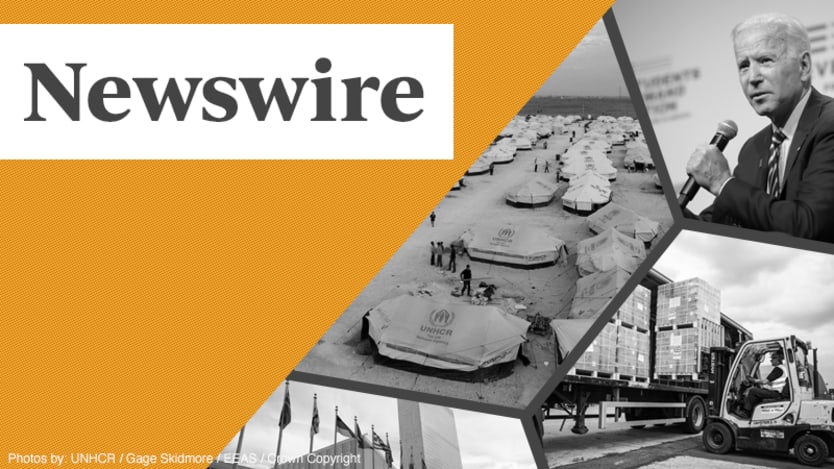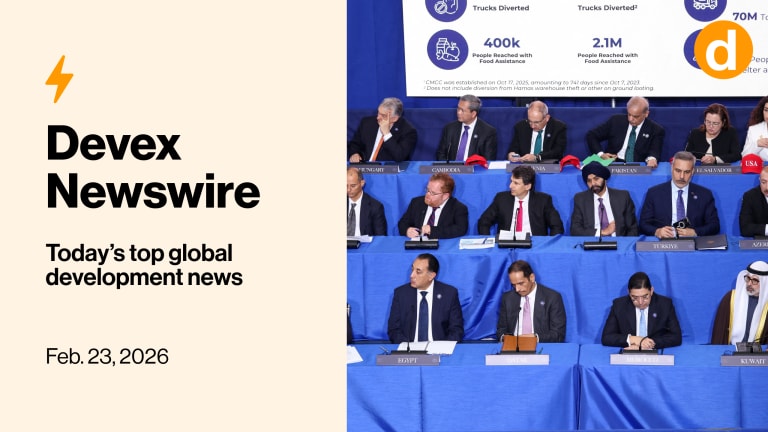Devex Newswire: Sex scandal at IDB and climate denial at World Bank
Presented by Data.org

It’s been a bad week for two bank presidents. One is out after a sex scandal; the other is on the rocks after a climate controversy. We have the latest on the fates of (now-ex) Inter-American Development Bank President Mauricio Claver-Carone and World Bank President David Malpass.
This is a preview of Newswire
Sign up to this newsletter for an inside look at the biggest stories in global development, in your inbox daily.
Also in today’s edition: Giving no-strings money to the world’s poor was once a radical idea. Today, cash transfers have gone mainstream, but not everyone’s bought into the hype.
A song of vice and fired
It’s official: Mauricio Claver-Carone is out as president of the Inter-American Development Bank after an ethics investigation found he had an affair with a subordinate and gave her preferential treatment, including a large salary hike.
The governors of IDB voted Monday to fire Claver-Carone, a Donald Trump administration nominee who was the first American to lead the major multilateral lender to Latin America and the Caribbean.
Claver-Carone has vehemently denied the accusations, which date to his time on the National Security Council in the Trump administration, when the investigation says he and the female staffer had the affair.
The Associated Press last week reported on a confidential report that alleged the affair posed a counterintelligence risk, and Treasury sources confirmed to Devex that Claver-Carone was not cooperating with investigators and said he needed to go.
But Claver-Carone’s supporters have cast him as a bulwark against China who’s been the victim of a political smear campaign. Claver-Carone told Reuters he’s going to sue.
In the meantime, my colleague Shabtai Gold reports that Reina Irene Mejía Chacón is taking over IDB, moving up from her role as executive vice president, per protocol. The next election for a president is likely to take place within the next two months, a source tells Shabtai.
Read: Latin American development bank ousts chief, ex-Citi banker takes over
+ If you have tips, get in touch at shabtai.gold@devex.com. We always protect our sources.
Holy COW
Another Trump nominee is also feeling the heat — but at least he’s still getting a paycheck.
Shabtai has been busy digging into the fallout from climate flip-flop by World Bank President David Malpass last week.
Malpass seemed to have a bit of an identity crisis when he declared “I’m not a scientist,” after being asked if climate change was caused by humans, before backtracking and insisting he’s “not a denier.”
That didn’t exactly quell the furor among folks such as former U.S. Vice President Al Gore — and reportedly some in the current administration — who are eager to get rid of him.
Shabtai has learned that Malpass has spoken with the World Bank’s Committee of the Whole, according to sources with knowledge of the meeting. The COW (yes, that is the real acronym) deliberates issues before they’re submitted to the board for guidance.
Malpass is also due to have a preplanned meeting with staffers this week that should offer a clearer picture of the temperature at the bank.
Will his employees accept the boss’ line that it was just a flubbed statement, or are they ready for the man who’s not a scientist and not a denier to also not be the World Bank president anymore?
ICYMI: World Bank chief clarifies climate beliefs amid calls for his ouster
+ Everybody contact Shabtai! Tell him all about the banks, your troubles, and tips for the NFL betting pool this weekend.
Cold hard cash
Years ago, giving low-income people cash to spend freely was seen as “experimental or even crazy,” GiveDirectly co-founder Michael Faye tells my colleague Stephanie Beasley.
Today, it’s seen as a paradigm shift in aid — and GiveDirectly is gladly taking the lead on it.
The U.S.-based nonprofit — which sends people one-time donations of around $1,000 — is the biggest philanthropic organization behind the popularity of cash transfers. Its adherents include none other than MacKenzie Scott and former Twitter CEO Jack Dorsey, among other wealthy bigwigs.
The United Nations and other organizations are embracing cash transfers, which got a huge boost during the pandemic, when they were used to help an estimated 1.36 billion people, according to the World Bank.
Still, Heath Henderson of Drake University, who’s writing a book tentatively titled “The Poverty of Cash,” tells Stephanie that cash transfers don’t address the systemic issues that trap people into poverty, such as a lack of education and that it’s “kind of surprising” that people aren’t more critical.
Read more: What GiveDirectly's rise tells us about the future of cash transfers (Pro)
It’s not at all surprising to Rory Stewart, who recently took the helm of GiveDirectly.
He tells my colleague William Worley that if his organization raises $1 billion — a big if — it will lift an entire country out of extreme poverty using cash transfers.
A one-time skeptic, Stewart tells Will he had a “damascene moment” while visiting Rwanda in March, when he saw how just a small amount of money “could transform so many dimensions of [an] individual’s life.”
“It’s the most radical, respectful step you can do, to give poor communities cash.”
Read: Give me $1B and I'll end poverty in a whole country, says Rory Stewart (Pro)
+ Keep your eye out for Will’s coverage of this week’s Labour Party conference and the U.K. opposition’s plans — or lack thereof — to restore the Department for International Development. In the meantime, check out all our analyses of the U.K. aid sector.
Inflation blues
Cash may be king, but inflation has become a royal pain.
Michael Belaro of the International Federation of Red Cross and Red Crescent Societies explains how food inflation is sapping the purchasing power of people in the Asia-Pacific region to buy food — straining IFRC’s cash assistance programs.
“We're seeing more and more of these cases not just in Sri Lanka, but also in highly volatile contexts such as Afghanistan and Pakistan,” he says.
Of the 2.3 billion people currently living with food insecurity, half are in Asia, according to a recent United Nations report. Today the Asian Development Bank announced $14 billion in funding through 2025 to battle the region’s food crisis.
Read: IFRC adjusts cash assistance program to fight food inflation (Pro)
Check out: We have a Devex Pro series on how organizations are responding to the food crisis. Read the series by starting your 15-day free trial of Devex Pro.
+ Sign up to Devex Dish, our free, must-read Wednesday newsletter about the global food system transformation.
In other news
An estimated $5 million in food aid has been lost in Haiti after attacks on World Food Programme warehouses, says U.N. envoy Helen La Lima. [BBC]
A recent survey found that nearly half of asset managers couldn’t think of a single decision to sell based on environmental, social, and governance issues in the past year. [Reuters]
One of two WFP trucks transporting aid in Ethiopia’s Tigray region was damaged and its driver injured after a drone strike hit the convoy on Sunday. [Al Jazeera]
Sign up to Newswire for an inside look at the biggest stories in global development.
Search for articles
Most Read
- 1
- 2
- 3
- 4
- 5








